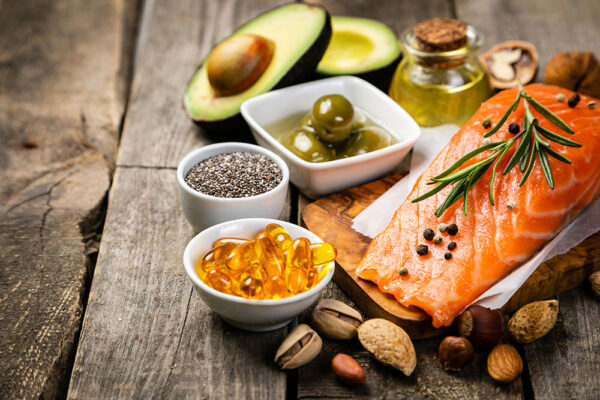U-Turn on Fats & Oils
Low fat diets are outdated and unhealthy. What’s more, some fats are pro-health and help protect us from heart disease, obesity, diabetes, cognitive decline & much more

Supermarket shelves are still lined with packaged foods that are ‘Low Fat’, ‘Cholesterol Lowering’, ‘Lite’ and more, in line with the idea that a low fat diet is healthy.
Dated Advice
This is a legacy from 1980s health advice. Mounting evidence today is turning this advice on its head. In fact, the potential health consequences of following such a diet are only now being examined and coming to light.
Recent research (The Lancet Study) found that low fat diets could raise the risk of early death by nearly 25%. 135,000 adults took part, and those who restricted intake of fats had much shorter lives than those who enjoyed butter, cheese and meat.
Health Impact of a Low Fat Diet
The National Obesity Forum together with the Public Health Collaboration have made a call for a “major overhaul” of current dietary guidelines, which encourage a low-fat diet. In their report, which is based on 43 studies, they found that:
- High fat diets are preferable in relation to weight loss
- Calorie counting is not beneficial
- Exercise doesn’t compensate for the wrong diet
- Saturated fat doesn’t cause heart disease
- Avoid processed foods labelled ‘low fat’ or ‘low cholesterol’
- Snacking contributes to weight gain
Dr Aseem Malhotra (Consultant cardiologist) said it was time “for a complete U-turn” in Britain’s approach to diet, and demonization of fat. The sooner we do that the sooner we reverse the epidemic in obesity and diabetes and the sooner start improving health.”
Change in Public Policy
Public policy is hard to change for many reasons, such as industry interests, threat to public trust in Government agencies and advice, and careers being tied in with certain recommendations. While response to the report was mixed, Public Health England’s chief nutritionist, Alison Tedstone, PhD said recommending a high-fat, low-carb diet as “irresponsible and potentially deadly,”
Good Fats and Bad Fats
Not all fats are equal, and some fats are harmful, while others are absolutely vital for good health. The main fats to go out of your way to avoid are trans fats and highly refined polyunsaturated omega-6 vegetable oils. To avoid such fats involves checking labels on packaged foods.
Fats to Enjoy
- Olives and olive oil (use it cold, not to be cooked with)
- Coconuts and coconut oil (can withstand higher temperatures without oxidizing)
- Organic, grass fed butter
- Raw nuts (avoid peanuts)
- Seeds
- Avocados
- Grass-fed, preferably organic meats
- Ghee (clarified butter)
- Eggs
- Omega-3 fats
Fats to Avoid
Highly refined vegetable oils: eg sunflower oil, palm oil, peanut oil, soy oil, canola oil, rapeseed oil, margarine – most supermarket pre-baked goods contain these, such as biscuits, mass produced bread, potato chips, cakes, pastries, etc.
Feedback from my clients is that most are still told by doctors and dieticians that they should avoid animal fats and eat vegetable oils and margarine to help protect particularly against heart disease. Recent research shows that heart disease is not contributed to by animal fats, but by excess carbohydrates and sugars. This can become confusing and is controversial. If you would like to speak to me about this in more detail please get in touch, you can also do more research online and examine for yourself the research that is throwing this advice into question. When under the care of your doctor for particular health conditions, I recommend staying in touch with them about any changes you wish to make.
If you have questions about how to include healthy fats in your diet please get in touch, I’m very happy to discuss it with you.


